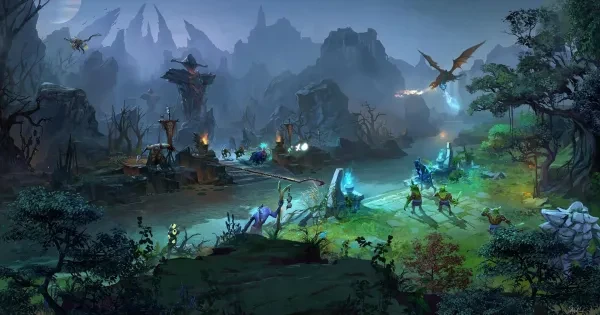YouTuber Accuses Million Dollar Game Auctions Of Fraud

Vintage video games, like factory-sealed copies of The Legend of Zelda and Super Mario Bros. for the Nintendo Entertainment System, have suddenly started selling for eye-popping prices, and a new video documentary claims potential fraud could be a big part of the reason why. It effectively charges auction houses, game graders, and certain collectors with conspiring to manufacture a retro game bubble and get rich in the process.
In a nearly hour-long video posted on August 23, YouTuber and GoldenEye 007 speedrunner Karl Jobst outlined a series of apparent conflicts of interest between Wata Games, the agency grading rare games, and Heritage Auctions, the company that has recently been selling them for record-breaking prices. Not only does he accuse Heritage Auctions of fraudulent behavior, he also questions the motives of Wata Games, which appears to be a revolving door between graders, collectors, and sellers. “There is a select group of very wealthy, very powerful people pulling the strings behind this recent spike in video game prices and the same people are making money hand over fist,” Jobst argues in his video.
Wata Games did not respond directly to a request for comment. However, Wata’ parent company has engaged the services of a PR firm called Goldin Solutions, which, among other reputation-related services, has provided “crisis communications” for some clients in the past. Goldin provided Kotaku with the following statement on Wata Games’ behalf:
Wata Games is the trusted leader in collectible video game grading and we’re honored to play a key role in this booming industry that we are incredibly passionate about. We’re humbled by the support of our thousands of customers who trust us to provide accurate and transparent grading. The claims in this video are completely baseless and defamatory and it is unfortunate that Mr. Jobst did not contact us to give us the opportunity to correct him.
(Update 8/25/2021, 4:21 p.m. ET: A spokesperson for Goldin Solutions reached out to clarify that the firm actually works for Collectors Universe—a collectibles grading company owned by an investors group—which purchased Wata Games just last month for an undisclosed amount. The spokesperson added that “most of our firm’s work—including for Collectors—is not crisis-oriented,” and that no one on its crisis management team had been involved in providing comment to Kotaku.)
Heritage Auctions did not respond to a request for comment in time for publication, but yesterday told told VGC it was not involved in any illegal or unethical practices.
G/O Media may get a commission
“Heritage Auctions wishes it had been given the opportunity to respond before the video’s publication, because there are numerous misstatements of fact and inaccurate conclusions contained within the piece,” a spokesperson told VGC. “Heritage strongly refutes any allegation that it or its officers are involved in shill bidding, ‘market manipulation’ or any similarly illegal or unethical practices. Heritage prides itself on our transparency and being a place built by and for collectors. With this in mind, we welcome the opportunity to discuss the video-game marketplace further, and would invite Mr. Jobst to our world headquarters in Dallas to tour our operations and speak further with leadership.”
The company, like Wata Games, did not elaborate any further on questions about conflicts of interest between the two.

In 2017, a mint-condition sealed copy of the original Super Mario Bros. sold for $30,000. In 2019, it sold for over $100,000. Just this month, it sold for $2 million. That’s an over 6500% increase in just four years. Something bizarre was clearly going on, and it increasingly looks like Heritage Auctions and others have played a role in hyping a gold rush in retro games untethered from their actual meaning and value to long-time collectors.
At the time, the 2019 sale of Super Mario Bros. was notable for setting a dramatic new record in gaming collectible prices. But as Jobst points out, and as Kotaku reported at the time, it was also being used to drum up publicity. The game was bought by Jim Halperin, Heritage Auction founder and co-chairman, coin dealer Rich Lecce, and game store Just Press Play owner Zac Gieg.
Heritage Auctions announced the deal in a press release touting the growing value of vintage games and its role in selling them. It quoted Wata Games president Deniz Kahn, whose company, which had only recently been founded, rated the condition of the game and was certifying others for auction at Heritage. As Kotaku previously reported, the seller, who didn’t want their identity publicized for privacy reasons, had previously consulted for Wata Games in a voluntary capacity.
The conflicts of interest don’t stop there, however. Wata Games’ company page showed Halperin was also at one time listed as an advisor to the video game grading agency. Wata Games, meanwhile, listed Heritage Auctions as a business partner going back to when it was first founded in 2017.
Why does all this matter? Wata Games makes money off of people sending in their games to have their condition rated. It charges a flat rate and an additional 2% of what the “fair market value” for the game is considered to be at the time, up to a cap of $100,000. Heritage Auctions makes commissions off of the sale of these Wata-rated games. It gets both a 5 to 10 percent seller’s fee on the front end and a buyer’s premium of 20 percent on the back end. More expensive gaming collectibles means more profit for Wata and Heritage, giving both outfits an incentive to try and inflate the market through public comments and targeted record sales like the 2019 Super Mario Bros. and the subsequent escalations.
And the market has inflated. As Kotaku reported back in 2019, deep-pocketed collectors have begun flooding the scene looking to snatch up rare games. In some cases these are retro enthusiasts, but in others they appear to be investors masquerading as collectors. One example Jobst points to is a dentist named Eric Naierman.
In 2019, the Washington Post reported Naierman had purchased a trove of valuable vintage games for $1 million. Using money from a group of business partners he called the Video Game Club, Naierman acquired the games, which the Post reported was ”one of the foremost collections in the world, both in terms of overall value and rarity.” The experts quoted in the article were Khan from Wata Games and Heritage’s video game consignment director, Valarie McLeckie. In interview footage that appeared in Jobst’s video, Naierman said he was on a mission to try and grow the market for rare game speculation and create major windfalls for his group of private investors.
“I deny that I or my fellow partners have been involved in any ‘market manipulation’ or similarly illegal or unethical practices,” Naierman told Kotaku in a text message. He said the group has been transparent about its dealings and got into collecting in 2019 after perusing Heritage Auction’s site for other memorabilia. “We have not taken any profit from our original investment,” he wrote.
Another major sale Jobst points to is the Carolina Collection. It belonged to Dain Anderson, a longtime collector and also the creator of the NintendoAge forums, an invaluable source of information for collectors with 15 years’ worth of posts. In 2019 Anderson sold both to Jeff Meyer, a comic book collector and owner of GoCollect, a source of valuation tools for collectors. Who rated the collection? Wata Games. Where were they sold? Heritage Auctions.

According to SEC filings first surfaced by Jobst, both Anderson and Meyer were at times involved in running Wata Games as well, something the rating agency didn’t disclose in a blog post about the collection. It also appears to contradict Kahn’s claims in the past that Wata employees are not allowed to have the company grade their games or sell games they owned that had previously been Wata-graded. Meyer also went on to nuke the NintendoAge forum, depriving collectors of easy access to historical pricing information in the process. Meyer and Anderson did not immediately respond to a request for comment.
(Update 8/25/2021, 6:03 p.m. ET: Anderson told Kotaku in an email that he dissolved his “relationship and equity arrangement” with Wata Games in 2017, which is why his name does not appear on subsequent SEC filings. “My role was never solidified in the company because I and the other WATA stakeholders could not come to an agreement regarding my role and stake in the company,” he wrote.)
Jobst’s video raised other concerning points about Wata Games and Heritage Auctions. Namely, that rating is ultimately a subjective art, and despite the growing prestige commanded by the Wata brand, it occasionally seems to get things wrong. Jobst points to a copy of Tomb Raider for Sega Saturn that was given an A+ rating despite appearing to have clear holes in its shrink wrap. Others have questioned seeming disparities in how Wata treated moldy copies of Excite Bike and Alpha Mission.
This isn’t the first time Jim Halperin and Heritage Auctions have courted controversy, either. “[Jim Halperin] has had brushes with postal inspectors, the Federal Trade Commission and coin dealers who have sued him for, among other things, sticking them with inflated prices,” read a Forbes profile from 2004. Among other things, Halperin and other Heritage Auction employees have been accused in the past of bidding on company auctions. Halperin posted a long rebuttal to the 2004 Forbes article the day it was published, but did not dispute the bidding part.
“As far as I know, no major auctioneer forbids employees to bid,” Halperin wrote at the time. “Our employees have no advantage over other bidders, are not allowed to access any information unavailable to our other bidders, and must pay the same Buyer’s Premium as everyone else. Our job as auctioneers is to create a fair and equitable marketplace, not to keep prices artificially low by excluding legitimate buyers.”
The obvious market bubble has even been enough to attract the attention of Trump #resistance thread man Seth Abramson himself. The Twitter pundit, whom the Columbia Journalism Review described as a “Lawyer turned poet turned professor turned journalist turned influencer,” recently tried to research a rough working list of how many actual copies of rare games are currently known to exist in the wild. It’s unclear how accurate his accounting is, but it does continue to raise questions about why Wata Games, which maintains its own, likely far more accurate, population reports, won’t release them.
Jobst’s video doesn’t have a smoking gun proving illegal or even malicious behavior by Heritage, Wata, and other parties, but it does contain an overwhelming amount of evidence that the current retro game collecting bubble is fueled more by speculation and get-rich-quick schemes than genuine collectors bidding one another up to absurd new prices. Bubbles inevitably pop. Who wins and who loses when they do is the real question.
The copy of Super Mario Bros. that sold for $2 million a few weeks ago didn’t come from a single collector. Instead it was sold by the collectibles site called Rally, where users pay to own shares of something valuable and then collect a profit if it eventually sells for a higher price. Rally originally bought the sealed copy in April 2020 for $140,000, leading to a princely payout for the site and its users when it finally dumped the asset this month. Sites like these don’t reflect the actual value placed on collectibles by those in the market for them. More often they reflect the same speculative hype that has recently driven the rapid valuation increases of joke crypto Dogecoin and meme stocks like GameStop.
And in the case of Super Mario Bros. at least, it shows people don’t necessarily want to spend millions to own a piece of video game history so much as own a piece of video game history to make millions selling it to the next bubble-riding investor.
Update 8/25/2021, 6:16 p.m. ET: A spokesperson for Heritage Auctions told Kotaku in an emailed statement that it has “always acted with the utmost integrity and has never falsely inflated the collector video-game marketplace or any other.” The statement continued:
While Heritage has a strong relationship with Wata, as well as other third-party grading companies and authenticators, Wata’s grading and activities are wholly independent from Heritage or its management. Jim [Halperin] was indeed an early minority stakeholder in Wata, through his nonprofit foundation that provides funding for arts-, education- and health-related endeavors.
Jim divested himself of his ownership in Wata earlier this year when that company was sold. The notion that Heritage somehow colluded in order to achieve results at auction is baseless and falsely assumes that transactions are fictitious when they are in fact very much real.
Heritage prides itself on transparency, which is why we post every result from every auction and maintain that information in our permanent archive, which is accessible by anyone who is interested in that information, including Heritage’s 1.5 million registered bidders worldwide. Heritage and Jim wholeheartedly agree that as the video-game marketplace continues to evolve and mature that population reports are an essential component needed to maintain its transparency.








